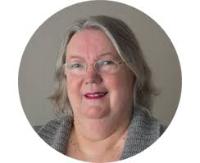Meet a Public Partner
Margaret Ogden

Tell us a bit about your background
I started out in the cancer networks and completed a high profile project in palliative care. But my Gran had developed dementia so I joined the Alzheimer’s Society as one of their volunteers in the North East research network. By this time I had developed serious illness myself so I had more to offer. However, the cancer and dementia research opened a lot of doors. I branched out in to projects on diversity, diabetes, mental health (depression), cardiac, strokes, irritable bowel syndrome (IBS), liver disease, infections, primary care, end of life (EOL), care homes. So my brand of Public and Patient Involvement (PPI) is one of breadth rather than depth. I like to do unusual projects such as recent participation in the creative arts. This introduced me to poetry.
What do you enjoy doing in your free time?
Writing poetry though at present it is confined to PPI. A recent example of my writing can be seen in a piece I created for the Fuse blog about my experience at the Fuse International Conference. I also like the ballet, opera, cinema, dining out, museums, art galleries, scrap booking and tarot reading. My interests are as diverse as my PPI activities.
How did you get involved in the Fuse public partner network?
It was via word of mouth. I was working with Michelle Collins at Lancaster University on public health, including a PPI evaluation. Michelle suggested I meet Susan Carr (Fuse Public Involvement and Engagement Lead) and there was a vacancy with the Fuse Public Involvement and Engagement Group. I applied and was successful. I’ve felt valued already and was thrilled when I was asked to present at the Fuse conference. It gave me the opportunity to speak about knowledge mobilisation – a topic I’d been involved with at Sheffield.
What areas of public health research are you particularly interested in?
Community engagement as this is my background professionally. I worked for Durham County Council Area Action Partnership as a Support Worker. It’s true to say we all bring skills and experiences from our day jobs. I’m also interested in alcohol, communities and places, climate change, air quality.
Have you been involved in research before?
Yes and some of it has been cutting edge, for example, thematic analysis, developing a coding framework and triangulation. I attended the International Research Summer School at Lancaster in 2011 where I learnt about focus groups, workshops and interviews. It was valuable training
Why is having your voice heard in public health research important to you?
Having firstly undertaken illness specific research, I wanted to also be involved in prevention and promotion – I currently do several projects including independent living, oral health in care homes, and a project called CHAMP1 which is about a brief but complex intervention – raising the issue of alcohol during meds reviews. I am co-applicant and also chair of the PPI group.
What one piece of advice would you share with someone curious about public involvement and engagement?
Follow your heart and take any training opportunities that come your way. This is vital for your personal development and you’ll soon see your CV begin to grow. Develop a specialism – mine is PPI evaluation and I’m using what I’ve learnt – so far I’ve done four evaluations and there are more to come. That’s more like three bits of advice.
Good luck in whatever direction you decide to follow.
Last modified: Fri, 29 Jul 2022 15:15:39 BST





